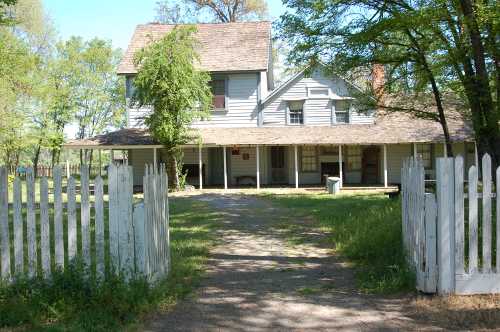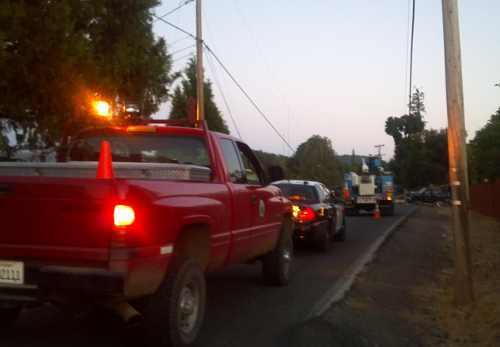- Elizabeth Larson
- Posted On
Anderson Marsh negotiations continue in wake of State Parks controversy

LAKE COUNTY, Calif. – The revelations last week that State Parks officials were hoarding millions of dollars while park closures were taking place around California has raised questions about how the situation could affect local parks.
The California Department of Parks and Recreation has held $54 million in two accounts over the past 12 years, according to recent disclosures that came to light through a Sacramento Bee investigation.
The resulting controversy has resulted in the resignation of State Parks Director Ruth Coleman – who visited Lake County in April 2011 to dedicate the new education pavilion at Clear Lake State Park – and her second-in-command’s firing.
The funds have been held aside at the same time as threats to state parks – from deferred maintenance to the more recent threats of closures – have arisen. A $22 million general fund cut to State Parks had resulted in the proposal to close 70 state parks by July 1.
Over the last several years, both Clear Lake State Park and Anderson Marsh State Historic Park have been listed among the proposed closures.
While Clear Lake State Park was taken off the list, Anderson Marsh was set for closure July 1, but spared thanks to negotiations between State Parks and the Anderson Marsh Interpretive Association for the group to operate the park.
AMIA President Roberta Lyons said the developments surrounding the funds have so far not affected the group’s negotiations with the state.
“We are currently negotiating the contract that will allow us to take over partial operation of the park,” Lyons told Lake County News. “We are hopeful that we will reach an agreement soon. They have approved our Operating Agreement, which is our proposal for the types of things we will be doing, the next step is actual approval of the contract.”
State Sen. Noreen Evans, who represents Lake County, has been involved with legislation to spare the parks set for closure, and she is asking that plans immediately be submitted to the Legislature for the reopening of every park that has been closed or incurred shorter operating hours.
She said State Parks officials who were involved in hiding the funds “are responsible for the decay at every park in the state that suffers from maintenance that has gone undone, the job losses across the state from shortened park hours or partial closures, the dollars lost by local communities and businesses that depended on the tourism dollars parks bring in to the state.”
Evans also is calling on Gov. Jerry Brown to conduct an administration-wide audit of every department and every division.
The California State Parks Foundation, which has worked to rally the public and raise funds to help keep state parks open, issued a statement in which it said it was “disappointed and shocked” about the revelations of the hidden funds.
“We are especially frustrated that this occurred at the same time CSPF and the parks community has been working diligently and against tremendous odds to help temporarily keep threatened parks open,” the group said in a Friday statement.
Foundation President Elizabeth Goldstein sent parks supports an email message late last week noting that “the crisis that our state parks face is still very real.”
Goldstein said budget cuts to state parks over the years have decimated the system, with the general fund allocation for state parks reduced by 33 percent over the past four years and the system also facing a growing $1.3 billion deferred maintenance problem.
The effort to preserve a local treasure
Henry Bornstein, an AMIA board member and the group’s treasurer, said he was shocked by the news of the State Parks Department’s hidden $54 million.
“The local parks people are doing a great job. I imagine they’re pretty angry themselves,” Bornstein said, noting they’re dealing with diminishing resources and the fact the state has spent nothing on parks in years.
He called it especially distressing in light of nonprofits like AMIA scurrying around to try to keep parks open.
“Our nonprofit wasn’t designed to run parks,” Bornstein said, adding that he would like to see all of the parks taken off the closure list as a result.
In addition to the resignation of Coleman and her deputy’s firing, Bornstein said AMIA has heard that the lawyer negotiating with them also may have been dismissed.
“We’ve been working incredibly hard,” he said. “I have no idea what happens now.”
He said AMIA believes it’s close to reaching a deal on its operating agreement with the state, “assuming we get final agreement on everything,” although Bornstein was concerned the work may be delayed because of the parks scandal.
Bornstein said AMIA is going to keep up its work. “Right now our park is open.”
AMIA also is planning a 30th anniversary park for Anderson Marsh on Saturday, Aug. 11.
To run Anderson Marsh, only a small amount is needed. He estimated AMIA could keep the park open for as little as $12,000 a year.
He said the state does not keep track costs on a per-park basis, and he doubts the accuracy of the state estimate of how much it’s spent on Anderson Marsh – $80,000 a year, with overhead.
Bornstein also raised the issue of the possible fallout for the parks themselves, which he calls an amazing asset for California, and like nothing found elsewhere in the world.
People need to understand parks are worth saving, he said.
“People have a hard time separating the parks from the people who are running them,” Bornstein said.
As for the controversy over the funds, he said, “I can’t imagine this is the end of it.”
Email Elizabeth Larson at This email address is being protected from spambots. You need JavaScript enabled to view it. .























